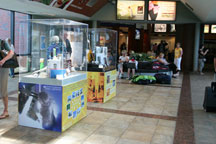| Posted: August 10, 2009 |
Educational nanotechnology exhibit at Rensselaer rail station |
|
(Nanowerk News) The College of Nanoscale Science and Engineering ("CNSE") of the University at Albany and the Capital District Transportation Authority ("CDTA") are partnering to publicize the global leadership of the UAlbany NanoCollege and New York State in nanotechnology - as well as the growing impact of nanoscale technologies in the 21st century - through a unique exhibit now on display at the Rensselaer Rail Station.
|
|
The exhibit - which incorporates high-tech items from CNSE's world-class Albany NanoTech Complex, such as silicon wafers, computer chips and biochips, and solar and fuel cells with nanotechnology-enabled consumer products, including an Xbox, iPod Touch, clothing and cosmetics - will be located through September at CDTA's Rensselaer Rail Station, the 10th-busiest station in the country, serving more than 830,000 people last year.
|
 |
| Educational nanotechnology exhibit at Rensselaer rail station.
|
|
The display provides the travelling public with a unique opportunity to learn about nanotechnology, described by the National Nanotechnology Initiative as "leading to the next Industrial Revolution," as it enables innovations in fields ranging from health care, energy and the environment to military, transportation, telecommunications and information technology, among many others.
|
|
Dr. Alain E. Kaloyeros, Senior Vice President and Chief Executive Officer of CNSE, said, "The UAlbany NanoCollege is delighted to partner with the Capital District Transportation Authority to share the exciting world of nanotechnology with the thousands of people who will utilize the Rensselaer Rail Station this summer. This is a great opportunity to highlight the role that nanotechnology is playing in addressing society's most critical issues, as well as the global recognition of CNSE and New York State, through the leadership of Governor Paterson and Assembly Speaker Silver, in building a nanotechnology sector that is attracting high-tech jobs, companies and investment to New York."
|
|
David M. Stackrow, Board of Directors Chairman of CDTA said, "The Capital District Transportation Authority is proud to collaborate with the College of Nanoscale Science and Engineering to make this unique nanotechnology exhibit available to travelers at CDTA's Rensselaer Rail Station. This display demonstrates the growing impact that nanotechnology is having in all areas of society, including transportation, while showcasing this region as a home for world-class nanoscale education and research, specifically through the exciting work being done at the NanoCollege."
|
|
The exhibit was first unveiled at Colonie Center last year as part of CNSE's NANOvember celebration, presented as part of "NEXSTEP," or "Nanotechnology Explorations for Science, Training and Education Promotion," a partnership between CNSE and KeyBank that features educational initiatives to promote greater understanding of the changing economic and business environment in the Capital Region and New York State being driven by nanotechnology.
|
|
About CNSE
|
|
The UAlbany CNSE is the first college in the world dedicated to education, research, development, and deployment in the emerging disciplines of nanoscience, nanoengineering, nanobioscience, and nanoeconomics. CNSE's Albany NanoTech Complex is the most advanced research enterprise of its kind at any university in the world. With over $5 billion in high-tech investments, the 800,000-square-foot complex attracts corporate partners from around the world and offers students a one-of-a-kind academic experience. The UAlbany NanoCollege houses the only fully-integrated, 300mm wafer, computer chip pilot prototyping and demonstration line within 80,000 square feet of Class 1 capable cleanrooms. More than 2,500 scientists, researchers, engineers, students, and faculty work on site at CNSE's Albany NanoTech, from companies including IBM, AMD, GlobalFoundries, SEMATECH, Toshiba, Applied Materials, Tokyo Electron, ASML, Novellus Systems, Vistec Lithography and Atotech.
|

